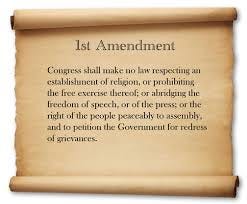Issue #84 Government July 14, 2022 (about 4 minutes reading time)
Congress shall make no law respecting an establishment of religion, or prohibiting the free exercise thereof; or abridging the freedom of speech, or of the press, or the right of the people peaceably to assemble, and to petition the Government for a redress of grievances.
The First Amendment to the Constitution of the United States is part of the Bill of Rights, which includes the first ten amendments passed in 1791 during the first term of President George Washington and after the official ratification of the Constitution in 1787.
The antifederalists, who were led by then-governor of Virginia Patrick Henry, opposed the ratification of the Constitution because they felt that it gave too much power to the federal government and lacked protection for people’s individual rights (meaning the rights of landowning white men only, of course).
Pro-constitution politicians, called Federalists, proposed a concession to the antifederalists, which led to the development of the Bill of Rights, which was ratified in 1791. These first ten amendments were written primarily by James Madison, who would later become the fourth president of the United States.
The First Amendment contains protections for five freedoms: speech, religion, the press, assembly, and petitioning the government. This amendment is one of the most misunderstood of all of the eventual twenty-seven amendments.
Thank you for reading and/or listening to this post. If you like this post, please “Like” this post by clicking the “Like” button at the bottom of this post. We would greatly appreciate reading your comment(s). Also, please scroll down to the end for more information about supporting our publication.
Listen to this post:
1. Freedom of Speech
Freedom of speech means that Americans can express themselves without worrying about government interference or retribution. “Freedom of speech” does not apply to private companies, nor does it mean that anyone can say anything without repercussions from other private citizens or corporations.
Some of the first things authoritarian-type governments and/or politicians do are to either attempt to silence the voices of those with whom they do not agree and/or claim that their “1st Amendment Rights” are being taken away if their opinions are not popular.
2. Freedom of the Press
An independent and constitutionally protected free press reports the facts, and journalists are usually the first people targeted by authoritarian governments and/or politicians. Just like in the general population, engaging in libel (spreading falsehoods or defamation in writing) and/or slander (verbally spreading falsehoods or defamation) is unethical and, in many instances, illegal.
But otherwise, protecting the rights of print and digital media to be free to report the facts is one of the most essential rights in a democracy that answers to the people, not to a person who wishes to be a dictator.
3. Freedom of Religion
Americans are guaranteed freedom of religion, meaning they have the right to practice their religion as they wish or practice no religion at all, as well as freedom from religion, because the 1st Amendment prohibits the government from establishing a “state” religion and favoring one religion over another. This is the basis of the established “separation of church and state.”
All through American history, and especially very recently, many fundamentalist Christians have been trying to turn the United States into a theocracy, which is exactly the opposite of what the Founders wanted, having just fought a war to free themselves from a religion-based monarchy.
4. Freedom of Assembly
People in the United States are guaranteed the right to gather in public protest through marches, rallies, and other forms of assembly without fearing retribution by the government. Both Black Lives Matter marches and Ku Klux Klan rallies are protected by the First Amendment, but acts of sedition and insurrection are not. The operative word in this right is peaceably.
Authorities may intervene when protests turn violent, pose threats to public safety, or result in riots or property damage. However, people are allowed to peacefully protest in what are considered public forums: parks, public squares, and sidewalks—even the sidewalks in front of the homes of Supreme Court justices.
5. Freedom to Petition
The right to petition the government for change without fear of retribution is used more than most people realize. Every time you sign a petition for changes in social or legal policy, you are exercising your First Amendment right. Other ways that you exercise your First Amendment right to petition the government may include:
Filing a lawsuit.
Testifying at a public meeting or before a government agency at any level, including before Congress.
Submitting a written complaint to a government agency.
Contacting a government official.
Circulating a ballot initiative or referendum for others to sign.
And most importantly, by voting, you are in essence petitioning the government for a change by voting to elect or re-elect or defeat a government official, support a cause on the ballot, or accept or deny a policy proposal.
The right and power to vote is the most powerful expression of your First Amendment right to petition the government without fear of retribution.
Let Us Know What You Think!
Help Us to Grow “We Are Speaking!”
Read and listen to “We Are Speaking” on the iOS app!
Please support us: subscribe for free or upgrade your current subscription to a paid level.




The fact that the despicable tRump was elected is another blemish on our history. Thanks for making that clear.
Absolutely no two sides to this "debate."